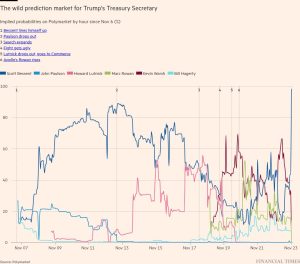Time to hit the pensions panic button
With less than three weeks to go until the Budget, speculation about potential pensions tax raids has reached fever pitch.
Those over the age of 55 are panicking over the possibility that the chancellor could slice the cap on tax-free cash to as low as £100,000. I do not think this will happen, but many people with large pensions are not willing to take this chance, and wealth managers report a surge in withdrawals.
Meanwhile, younger readers — especially those with young children — are fretting about a much more credible rumour that Rachel Reeves could charge national insurance on employer pension contributions.
Before we delve into the details, let’s look at the bigger picture. She’s going to have to increase taxes on pensions somewhere. The problem is how to do this without imperilling her central mission of delivering a Budget for growth, breaking manifesto pledges or upsetting the trade unions. I fear the much bigger problem of most people not saving enough for retirement risks being overlooked.
Reeves will want to target tax rises on those with the broadest shoulders and the biggest pension pots. But having delighted unions with above-inflation pay settlements in week one, she will not want to enrage them in week seventeen. For this reason, the pensions expert John Ralfe, tells me his acid test for Budget pensions rumours is “how would this affect NHS consultants?”
His theory is the political imperative to cut NHS waiting lists massively reduces the likelihood of any pensions tax changes that could prompt doctors to retire early or cut their hours. “The British Medical Association have an effective right of veto over UK pensions policy,” he adds, noting how Reeves was recently forced to U-turn on plans to reintroduce the lifetime allowance.
Cutting pensions tax relief for higher earners looks to be off the table as it would cause tax problems for doctors and other public sector workers. Now rumours about lump sum reductions are causing blue lights to flash.
Graham Crossley, an NHS pensions specialist at Quilter, has received many panicked phone calls from medics in their late fifties this week asking if it’s too late to submit their retirement application forms before the Budget.
Fiscal drag offers a more palatable solution. Freeze the maximum tax-free lump sum at £268,275 and, as inflation takes its course, people can slowly adjust their retirement plans. Crossley reckons the purchasing power of this sum will have dwindled to £150,000 after 10 to 15 years. But Reeves needs policies that could start filling the black hole within as many months.
Those of us toiling in the private sector typically pay into defined contribution (DC) pension schemes that are nowhere near as generous as defined benefit (DB) schemes common in the public sector. If Ralfe’s theory is right, tax rises that focus pain on the private sector are more likely.
Ending the inheritance tax benefits of DC pensions is one widely tipped Budget measure. Charging employers national insurance on staff pension contributions is another.
This passes Ralfe’s test, as public sector employers would be reimbursed for any extra costs. And it just about squeaks around Labour’s manifesto pledge not to raise NI for working people. But raising NI on the pension contributions that private sector companies make for their staff is obviously going to have major consequences for workers in future.
A snap poll by the ABI found that nearly half of employers who currently pay more than the bare minimum into staff pension schemes would reduce their contributions were this to happen. There would also be knock-on effects for the labour market and your chances of getting a pay rise in future, which could short-change your retirement savings.
But it also threatens the future of salary sacrifice schemes used by most large private sector employers in the UK and, in turn, the ability of many readers to navigate one of the most costly cliff edges in the tax system.
Sacrificing more pay into your pension to avoid the “£100,000 tax trap” of high marginal rates and the loss of state childcare benefits is a tactic increasingly deployed by professional parents in recent years.
If one parent earns a penny over this threshold, this could instantly add thousands of pounds to a family’s annual childcare bill as “free” nursery hours and tax-free childcare are lost. Yet try and out-earn this problem, and you face a 62 per cent marginal rate of tax on income between £100,000-£125,125 as the personal allowance is tapered away.
Increasing your pension contributions to avoid both of these issues has been a valuable loophole. But for companies, using salary sacrifice schemes to avoid 13.8 per cent employer NI on staff pension contributions has been an even bigger one!
Could Budget day changes close this? The short answer is “perhaps”. Exchanging a slice of salary in return for a non-cash benefit means employers effectively fund 100 per cent of a worker’s pension contributions, and would be exposed to paying NI on all of it.
If Reeves imposed NI at the full whack, this could raise up to £12bn a year. Sir Steve Webb, the former pensions minister and now a partner at LCP, has suggested a much smaller levy of 2 per cent, saying this would still raise a couple of billion, but wouldn’t frighten the horses too much.
If that were the case, employers would likely still keep salary sacrifice schemes going — Webb points out they’d still be saving 11.8 per cent — and either absorb the extra costs, or cut the value of their contributions. Having started down this path, the chancellor could increase this levy at a future Budget. But this would make increasing employers’ default auto-enrolment contributions a much harder sell in future.
We don’t know if this will happen, let alone the precise terms of any new rules. But tax experts I’ve canvassed this week think a consultation would be required, meaning any changes would be pushed into the next tax year. Even if this did sound the death knell for salary sacrifice schemes, those navigating the £100,000 cliff edge could still opt to pay more into a workplace or private pension scheme, though this would involve much more admin, and potentially a loss of NI savings for workers too.
We have been warned to expect a painful Budget, but if the tax ratchet is only applied to private sector pensions, it will widen the gulf between public and private pension schemes even further. Whatever route the chancellor decides to take, improving retirement outcomes by incentivising all workers to save and invest should not be forgotten.
Claer Barrett is the FT’s consumer editor and the author of ‘What They Don’t Teach You About Money’. [email protected] Instagram @Claerb
#Time #hit #pensions #panic #button





